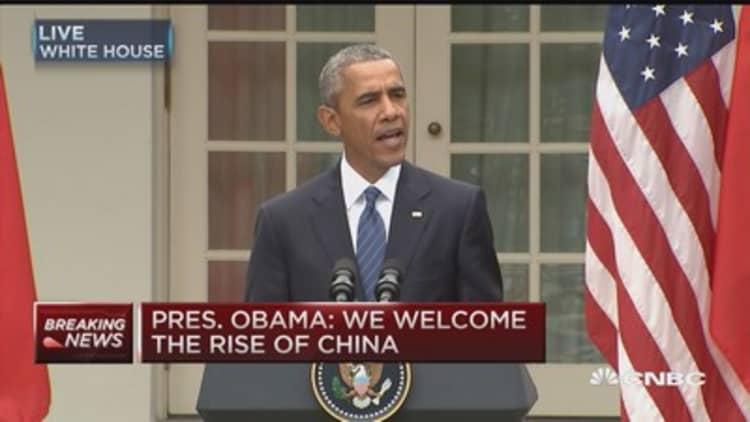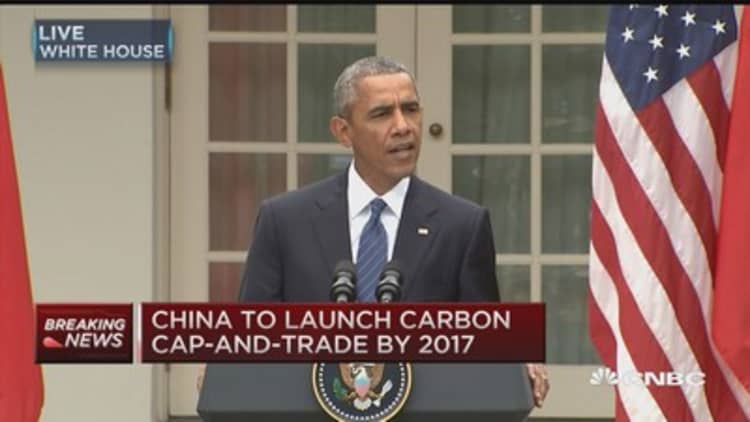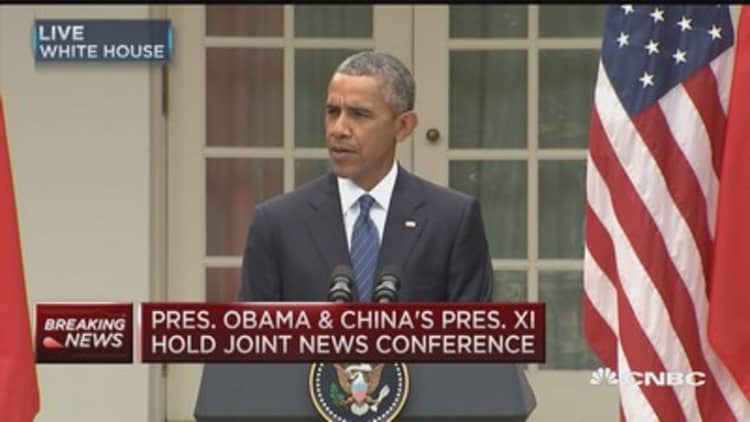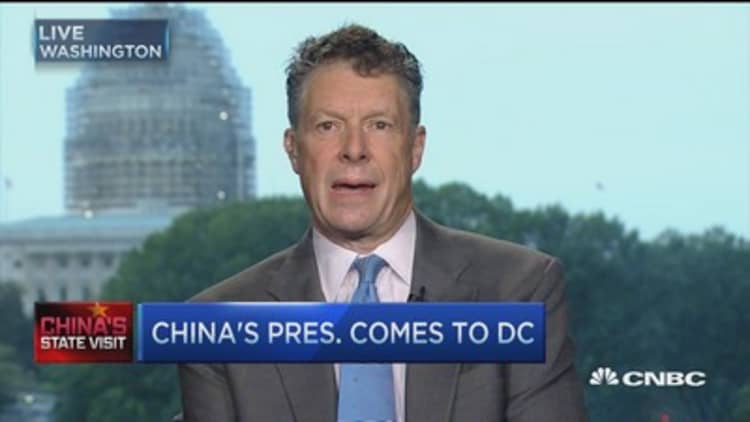US-China agree to not conduct cybertheft of intellectual property
WATCH NOW
WATCH NOW
WATCH NOW
WATCH NOW
This is a breaking news article. Please check back for updates.
The U.S. and China have agreed that neither government would support or conduct cyber-enabled theft of intellectual property, U.S. President Barack Obama said in a joint media conference with Chinese President Xi Jinping on Friday.
The Obama administration said that both countries are committed to finding appropriate norms of state behavior in cyberspace within the international community. The countries also agreed to create a senior experts group for further cyber affairs discussion, the White House said.
“I raised, once again, our very serious concerns about growing cyberthreats to American companies and American citizens. I indicated that it has to stop,” Obama said. “The United States government does not engage in cyber economic espionage for commercial gain, and today I can announce that our two countries have reached a common understanding on a way forward.”
There had been some suggestion that the two presidents could announce an agreement to not hack each other’s critical infrastructure during peacetime, but experts told CNBC that they did not expect any news on corporate cybertheft—which many consider to be the primary problem in the space.
“China and the United States are two major cyber countries, and we should strengthen dialogue and cooperation. Confrontation and friction are not the right choice for both sides,” Xi said through a translator, reiterating Obama’s comments about the details of the agreement.
The Chinese leader said the new consensus is a victory for both countries as “cooperation will benefit both, and confrontation will lead to losses on both sides.” He said his country “strongly opposes and combats” the theft of commercial secrets and other kinds of hacking attacks.
Beijing has long denied conducting any digital offensives—in either the corporate or governmental realms—but most U.S.-based cybersecurity experts say the country is the most frequent attacker of western interests. Attribution, however, is difficult in cyberspace, so many of those hacks could theoretically have come from private actors.
“If the U.S. side has concerns in this respect, we can through the existing channels express these concerns,” Xi said. “The Chinese side will take seriously the U.S. provision of any information.”
When asked about the details of the cybertheft agreement, Obama said “the good news from my perspective is...we have made significant progress in agreeing to how our law enforcement and investigators are going to work together, how we’re going to exchange information, how we’re going to go after individuals or entities who are engaging in cybercrimes or cyberattacks.”
“The question now is: Are words followed by actions?” Obama said. “And we will be watching carefully to make an assessment as to whether progress has been made in this area.”
The U.S. president highlighted his prior executive action that allows for sanctions against those who have digitally attacked U.S. companies or individuals. He added that he did not discuss specific hacking cases with Xi, but he said he emphasized that the U.S. will use the tools at its disposal to go after hackers around the world.
Obama admitted that neither he nor Xi can guarantee the actions of all of their citizens, but he said he can promise that the U.S. will not sponsor corporate cybertheft—and he hopes China can do the same.
While international rules for cyberspace are relatively undeveloped, China and the U.S. can work with other world powers to begin development on “an architecture to govern behavior” that is enforceable and clear, Obama said.

President Barack Obama (R) shakes hands with Chinese President Xi Jinping during a state arrival ceremony on the south lawn of the White House grounds September 25, 2015 in Washington, DC.

President Barack Obama (R) shakes hands with Chinese President Xi Jinping during a state arrival ceremony on the south lawn of the White House grounds September 25, 2015 in Washington, DC.
The Obama administration had hinted at sanctions against Chinese entities for cyber-espionage activities before Xi’s visit, but none was announced.
Beyond cybersecurity issues, the primary areas of contention in the relationship are human rights issues and geopolitical concerns—including China’s island-building in the South China Sea, and the U.S. military presence in the region.
On the Asian-Pacific security front, Obama said the two countries had agreed to new channels of communication to “reduce the risks of miscalculations between our militaries.”
In his address after the meeting, Xi emphasized that he believed the U.S. and China share a common interest in the region, so the countries should continue to deepen their dialogue and work together to promote cooperation.
The U.S. president said he told Xi that the U.S. will continue to sail, fly and operate anywhere that international law allows—including the South China Sea, which Beijing had protested. Obama also said he shared his “concern” with Xi over its actions in that area.
“I encouraged a resolution between claimants in these areas. We are not a claimant, we just want to make sure that the rules of the road are upheld,” Obama said.
Xi pushed back on the suggestion that China might compromise on its positions.
“Islands in the South China Sea since ancient times are China’s territory,” Xi said.. “We have the right to uphold our own territorial sovereignty and lawful and legitimate maritime rights and interests. We are committed to maintaining peace and stability in the South China Sea, managing differences and disputes through dialogue, and addressing disputes through negotiation, consultation and peaceful manner.”
Xi said the Chinese construction activities on disputed islands in the South China Sea “do not impact any country,” and Beijing does not intend to militarize the area.
On the subject of human rights, Obama said he emphasized the U.S. position on these issues—which include the treatment of journalists—with his Chinese counterpart. “Obviously we recognize that there are real differences there, and President Xi shared his views in terms of how he can move forward in a step-by-step way that preserves Chinese unity,” Obama said.
“Democracy and human rights are the common pursuits of mankind,” Xi said. “At the same time, we must recognize that countries have different historical processes and realities, that we need to respect the people of all countries’ rights to choose their own development path independently.”
The Chinese leader announced that his government is ready to conduct a human rights dialogue with the U.S. and “progress together.”
In officially welcoming Xi to the White House, Obama reflected on “a history of friendship and cooperation” between the two countries,” and welcomed the rise of a peaceful and prosperous China.
The presidents touted initiatives to encourage American students to learn Mandarin Chinese, and boost bilateral tourism.
“If our countries are going to do more together around the world, then speaking each other’s language, truly understanding each other, is a good place to start,” Obama said.
In a Friday statement released ahead of a joint press conference, Obama and Xi outlined their common vision for a global climate change agreement, and outlined new steps they will take to deliver on pledges made last year to slash their greenhouse gas emissions.
Those included confirmation by Xi that China will launch a national carbon cap-and-trade system in 2017 to help contain the country’s emissions, which will build on seven regional pilot markets already operating in China. Such systems put limits on carbon emissions and open up markets for companies to buy and sell the right to produce emissions.
The joint presidential statement was a highlight of a state visit to Washington by Xi. It built on a bilateral announcement on climate change last November, when the United States pledged to reduce its greenhouse gas emissions 26 to 28 percent below 2005 levels by 2025, while China agreed to cap its rising emissions by at least 2030.
The statement aimed to show “the determination of both countries to act decisively to achieve the goals set last year.”
China is already the world’s largest carbon emitter, but its status as a developing country has meant it is under no obligation to promise carbon cuts, a situation that has irked U.S. politicians and other industrialized nations.
For Obama, securing a new global agreement on climate change that erases some of the divisions between industrialized and emerging economies is a key priority. The deal with China strengthens his hand ahead of a global summit on climate change in Paris in December.
China’s proposed cap-and-trade system would create the world’s biggest carbon market. Democratic lawmakers tried to pass legislation to create such a system in the United States but it failed to win enough votes in a divided Senate in 2010.
China also announced on Friday that it would channel 20 billion RMB ($3.1 billion) to help developing countries combat and adapt to climate change, a significant financial pledge from an emerging economy.
For its part, Washington reaffirmed a pledge it made last year to channel $3 billion into a U.N.-backed Green Climate Fund. But Congressional wrangling over the federal budget threatens to delay the implementation of the pledge.
The two countries also agreed on the need for an “enhanced transparency system” in a United Nations climate agreement to ensure trust and confidence in the framework to be agreed in Paris in December.
They also said a new global climate deal should require countries to “ramp up” their national emission reduction commitments periodically.
Beyond climate concerns, major topics of recent discussion concerning the bilateral relationship include economic reform, scientific cooperation, and military-to-military ties.




No comments:
Post a Comment
Comments always welcome!